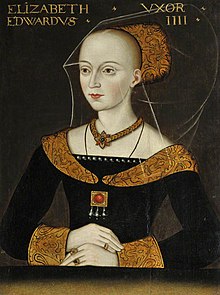Elizabeth Woodville
| Elizabeth Woodville | |
|---|---|

Portrait of Elizabeth Woodville as Queen of England c.1472
|
|
| Queen consort of England | |
| Tenure | 1 May 1464 – 3 October 1470 11 April 1471 – 9 April 1483 |
| Coronation | 26 May 1465 |
| Born | c. 1437 Grafton Regis, Northamptonshire |
| Died | 8 June 1492 (aged 55) Bermondsey, London |
| Burial | St. George's Chapel, Windsor |
| Spouse |
Sir John Grey (m. c. 1452–61; his death) Edward IV of England (m. 1464–83; his death) |
| Issue |
Thomas Grey, Marquess of Dorset Richard Grey Elizabeth, Queen of England Mary of York Cecily, Viscountess Welles Edward V, King of England Margaret of York Richard, Duke of York Anne, Lady Howard George, Duke of Bedford Catherine, Countess of Devon Bridget of York |
| Father | Richard Woodville, 1st Earl Rivers |
| Mother | Jacquetta of Luxembourg |
| Religion | Roman Catholic |
Elizabeth Woodville (also spelled Wydville, Wydeville, or Widvile; c. 1437 – 8 June 1492) was Queen consort of England as the spouse of King Edward IV from 1464 until his death in 1483. At the time of her birth, her family was mid-ranked in the English aristocracy. Her first marriage was to a minor supporter of the House of Lancaster, Sir John Grey of Groby; he died at the Second Battle of St Albans, leaving Elizabeth a widowed mother of two sons. Her second marriage, to Edward IV, was a cause célèbre of the day, thanks to Elizabeth's great beauty and lack of great estates. Edward was only the second king of England since the Norman Conquest to have married one of his subjects, and Elizabeth was the first such consort to be crowned queen. Her marriage greatly enriched her siblings and children, but their advancement incurred the hostility of Richard Neville, Earl of Warwick, 'The Kingmaker', and his various alliances with the most senior figures in the increasingly divided royal family.
This hostility turned into open discord between King Edward and Warwick, leading to a battle of wills that finally resulted in Warwick switching allegiance to the Lancastrian cause. Elizabeth remained politically influential even after her son, briefly proclaimed King Edward V of England, was deposed by her brother-in-law, Richard III, and she would play an important role in securing the accession of Henry VII to the throne in 1485, which ended the Wars of the Roses. After 1485, however, she was forced to yield pre-eminence to Henry's mother, Lady Margaret Beaufort, and her influence on events in these years, and her eventual departure from court into retirement, remains obscure.
...
Wikipedia
